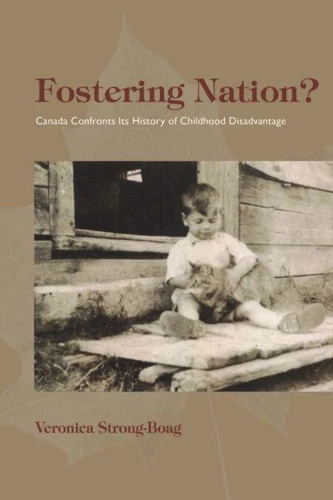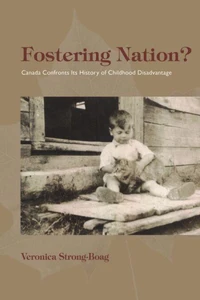Fostering Nation?. Canada Confronts Its History of Childhood Disadvantage
Par :Formats :
Disponible dans votre compte client Decitre ou Furet du Nord dès validation de votre commande. Le format ePub est :
- Compatible avec une lecture sur My Vivlio (smartphone, tablette, ordinateur)
- Compatible avec une lecture sur liseuses Vivlio
- Pour les liseuses autres que Vivlio, vous devez utiliser le logiciel Adobe Digital Edition. Non compatible avec la lecture sur les liseuses Kindle, Remarkable et Sony
 , qui est-ce ?
, qui est-ce ?Notre partenaire de plateforme de lecture numérique où vous retrouverez l'ensemble de vos ebooks gratuitement
Pour en savoir plus sur nos ebooks, consultez notre aide en ligne ici
- Nombre de pages318
- FormatePub
- ISBN978-1-55458-798-8
- EAN9781554587988
- Date de parution28/09/2011
- Protection num.Digital Watermarking
- Taille2 Mo
- Infos supplémentairesepub
- ÉditeurWilfrid Laurier University Press
Résumé
Fostering Nation? Canada Confronts Its History of Childhood Disadvantage explores the missteps and the promise of a century and more of child protection efforts by Canadians and their governments. It is the first volume to offer a comprehensive history of what life has meant for North America's most disadvantaged Aboriginal and newcomer girls and boys. Gender, class, race, and (dis)ability are always important factors that bear on youngsters' access to resources.
State fostering initiatives occur as part of a broad continuum of arrangements, from social assistance for original families to kin care and institutions. Birth and foster parents of disadvantaged youngsters are rarely in full control. Children most distant from the mainstream ideals of their day suffer, and that suffering is likely to continue into their own experience of parenthood. That trajectory is never inevitable, however.
Both resilience and resistance have shaped Canadians' engagement with foster children in a society dominated by capitalist, colonial, and patriarchal power. Fostering Nation? breaks much new ground for those interested in social welfare, history, and the family. It offers the first comprehensive perspective on Canada's provision for marginalized youngsters from the nineteenth to the twenty-first century.
Its examination of kin care, institutions, state policies, birth parents, foster parents, and foster youngsters provides ample reminder that children's welfare cannot be divorced from that of their parents and communities, and reinforces what it means when women bear disproportionate responsibility for caregiving.
State fostering initiatives occur as part of a broad continuum of arrangements, from social assistance for original families to kin care and institutions. Birth and foster parents of disadvantaged youngsters are rarely in full control. Children most distant from the mainstream ideals of their day suffer, and that suffering is likely to continue into their own experience of parenthood. That trajectory is never inevitable, however.
Both resilience and resistance have shaped Canadians' engagement with foster children in a society dominated by capitalist, colonial, and patriarchal power. Fostering Nation? breaks much new ground for those interested in social welfare, history, and the family. It offers the first comprehensive perspective on Canada's provision for marginalized youngsters from the nineteenth to the twenty-first century.
Its examination of kin care, institutions, state policies, birth parents, foster parents, and foster youngsters provides ample reminder that children's welfare cannot be divorced from that of their parents and communities, and reinforces what it means when women bear disproportionate responsibility for caregiving.
Fostering Nation? Canada Confronts Its History of Childhood Disadvantage explores the missteps and the promise of a century and more of child protection efforts by Canadians and their governments. It is the first volume to offer a comprehensive history of what life has meant for North America's most disadvantaged Aboriginal and newcomer girls and boys. Gender, class, race, and (dis)ability are always important factors that bear on youngsters' access to resources.
State fostering initiatives occur as part of a broad continuum of arrangements, from social assistance for original families to kin care and institutions. Birth and foster parents of disadvantaged youngsters are rarely in full control. Children most distant from the mainstream ideals of their day suffer, and that suffering is likely to continue into their own experience of parenthood. That trajectory is never inevitable, however.
Both resilience and resistance have shaped Canadians' engagement with foster children in a society dominated by capitalist, colonial, and patriarchal power. Fostering Nation? breaks much new ground for those interested in social welfare, history, and the family. It offers the first comprehensive perspective on Canada's provision for marginalized youngsters from the nineteenth to the twenty-first century.
Its examination of kin care, institutions, state policies, birth parents, foster parents, and foster youngsters provides ample reminder that children's welfare cannot be divorced from that of their parents and communities, and reinforces what it means when women bear disproportionate responsibility for caregiving.
State fostering initiatives occur as part of a broad continuum of arrangements, from social assistance for original families to kin care and institutions. Birth and foster parents of disadvantaged youngsters are rarely in full control. Children most distant from the mainstream ideals of their day suffer, and that suffering is likely to continue into their own experience of parenthood. That trajectory is never inevitable, however.
Both resilience and resistance have shaped Canadians' engagement with foster children in a society dominated by capitalist, colonial, and patriarchal power. Fostering Nation? breaks much new ground for those interested in social welfare, history, and the family. It offers the first comprehensive perspective on Canada's provision for marginalized youngsters from the nineteenth to the twenty-first century.
Its examination of kin care, institutions, state policies, birth parents, foster parents, and foster youngsters provides ample reminder that children's welfare cannot be divorced from that of their parents and communities, and reinforces what it means when women bear disproportionate responsibility for caregiving.





